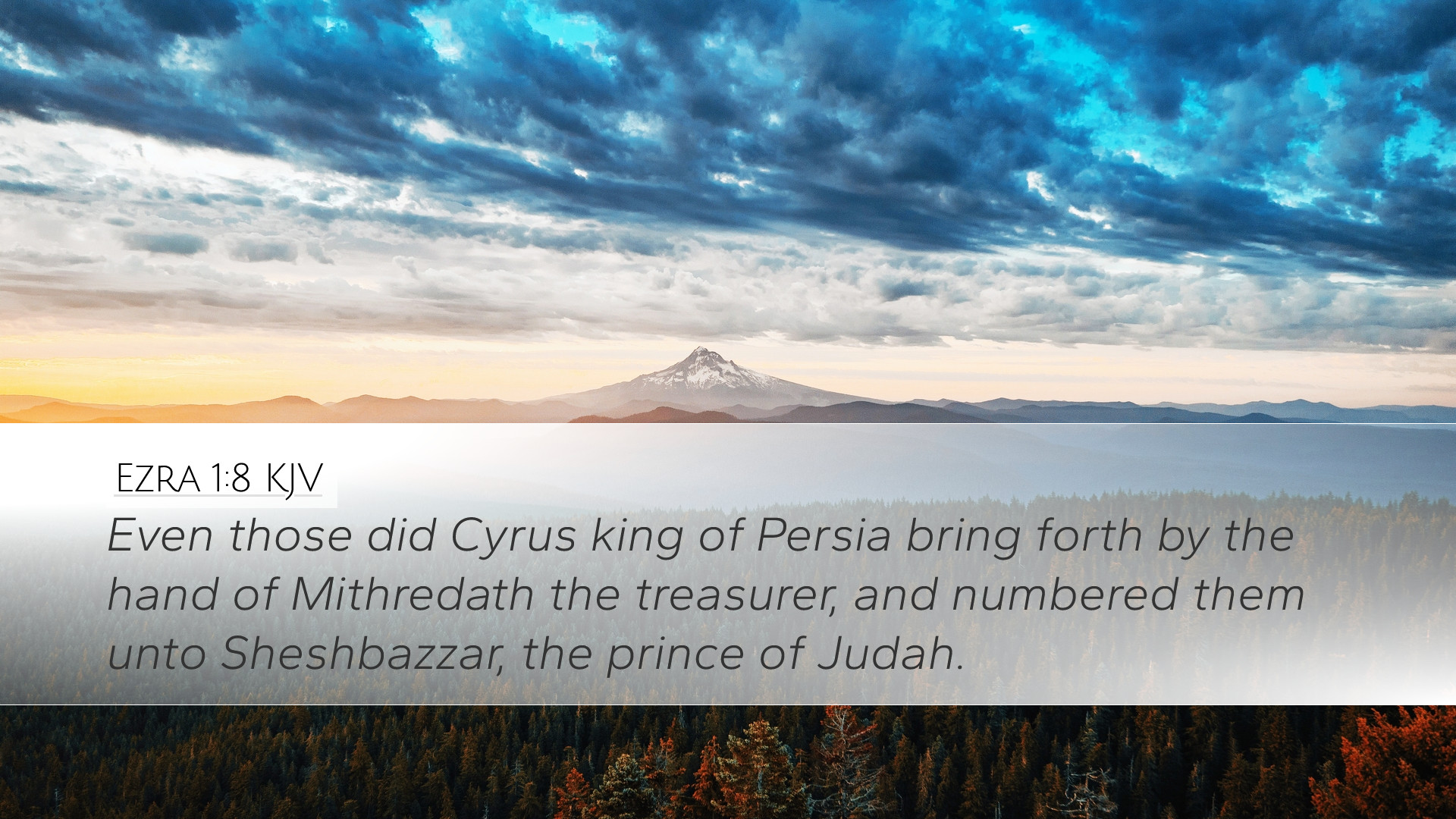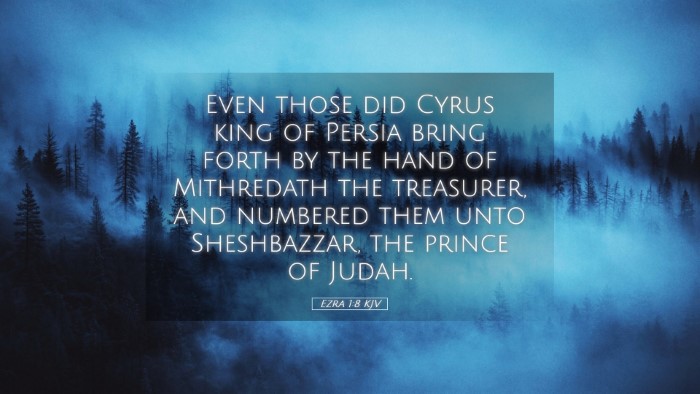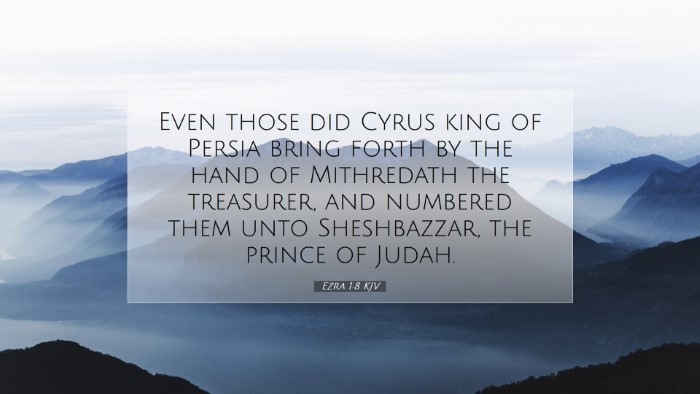Old Testament
Genesis Exodus Leviticus Numbers Deuteronomy Joshua Judges Ruth 1 Samuel 2 Samuel 1 Kings 2 Kings 1 Chronicles 2 Chronicles Ezra Nehemiah Esther Job Psalms Proverbs Ecclesiastes Song of Solomon Isaiah Jeremiah Lamentations Ezekiel Daniel Hosea Joel Amos Obadiah Jonah Micah Nahum Habakkuk Zephaniah Haggai Zechariah MalachiEzra 1:8
Ezra 1:8 KJV
Even those did Cyrus king of Persia bring forth by the hand of Mithredath the treasurer, and numbered them unto Sheshbazzar, the prince of Judah.
Ezra 1:8 Bible Commentary
Commentary on Ezra 1:8
Ezra 1:8 states: "Even those that were about him, with the things that were offered to the house of the Lord, which was in Jerusalem." This passage is pivotal, representing God's fulfillment of His promises to His people and the restoration of the Temple.
Contextual Background
The book of Ezra opens during the time of the Persian Empire, a significant turning point in Jewish history. The Israelites, after years of Babylonian captivity, are about to embark on a journey back to Jerusalem to rebuild the temple. This is not merely a historical account but a theological statement regarding God's sovereignty and faithfulness.
Insights from Matthew Henry
Matthew Henry emphasizes the divine hand at work in the exodus of the Israelites from Babylon. He notes that the Lord stirred up the spirit of Cyrus, the Persian king, leading to the decree for the Jews to return to their homeland. Henry comments on the importance of this act as it reflects God's promise to restore His people.
- God's Sovereignty: Henry points out that God is in control, using even pagan rulers to fulfill His purposes. This act of Cyrus confirms the providence of God in the affairs of nations.
- Emphasis on Worship: The return to Jerusalem is primarily about the restoration of worship in the Temple, highlighting the centrality of worship in the life of the community.
Insights from Albert Barnes
Albert Barnes, in his commentary, provides a thorough examination of the historical and theological implications of this verse. He insists that the items mentioned were significant for the upcoming restoration of the temple.
- Material Contributions: Barnes reflects on the materials provided for the Temple—gold, silver, and other valuables—as they symbolize both physical and spiritual wealth. These offerings from the exiled community underscore their dedication to God and the importance of establishing a place for worship.
- Role of Cyrus: Barnes notes that Cyrus’s decree serves as an instrument of divine mercy. His willingness to support the Jews in their return shows God’s ability to turn the hearts of kings as He wills.
Insights from Adam Clarke
Adam Clarke offers an in-depth analysis of the verse, focusing on the importance of the objects mentioned. He states that these offerings were not merely for the construction of a physical structure but were vital for reviving the covenant community.
- Covenant Renewal: Clarke highlights that the return of the exiles represents a renewed relationship with God. The offerings are a symbolic act of returning to faithfulness and obedience, as they prepare to re-establish their identity as God’s chosen people.
- Community Involvement: The collaboration of those around Cyrus signifies communal involvement in the task of restoring Jerusalem. Clarke points out how collective support is essential in the life of the church today.
Theological Reflections
The journey back to Jerusalem encapsulates significant themes of redemption, restoration, and worship. It calls attention to God's unyielding faithfulness to His promises, reassuring believers that, despite circumstances, they are not abandoned.
- Redemption: The Israelites' return signifies a powerful reminder of God’s redemptive work throughout history, which encourages believers to trust in His plans, even in times of desolation.
- Restoration: The restoration of the Temple illustrates the importance of community worship and the central role of the church as the body of Christ today, an essential theme for pastors and theologians alike.
Practical Applications
This verse serves as an inspiration for modern believers and leaders in the church. It prompts several practical applications:
- Faithfulness in Leadership: The example of Cyrus shows how even non-believers can be used by God for His purposes. Leaders in today's church should embrace their role in promoting God's agenda.
- Community Engagement: Just as in Ezra’s time, community involvement in church activities is crucial. Building the church, both physically and spiritually, requires collective effort.
- Focus on Worship: Emphasizing worship is fundamental to maintaining a vibrant church community. The restoration of the Temple signifies the need to prioritize worship in all church undertakings.
Conclusion
In summary, Ezra 1:8 not only narrates a historical event but encapsulates deep theological truths relevant to every generation. The insights from Matthew Henry, Albert Barnes, and Adam Clarke provide a rich understanding that equips pastors, students, and scholars to grasp the implications of God's faithfulness and the community's response to His call. As we reflect on this verse, may we be inspired to contribute actively to the work of God in our midst, recognizing His guiding hand in our lives.


